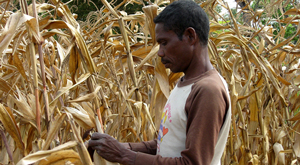Today is World Food Day, a time to reflect on the individual and social costs of malnutrition, from high childhood mortality rates, stunted growth and obesity to lost national economic productivity.
The focus of this year's World Food Day is 'Sustainable food systems for food security and nutrition'.
Around the world, about 840 million people are hungry, one in four children is stunted and 1.4 billion people are overweight.
Malnutrition is an underlying factor in up to 45 per cent of deaths of children under five. Malnourished children who survive childhood can suffer lifelong damage such as blindness and poor intellectual development.
Malnutrition is also responsible for the loss of billions of dollars in productivity, in effect stunting not only people, but also economies. Escalating rates of overweight and obesity place many national economies and health systems under additional strain.
'Good nutrition comes from a combination of good food, good care and good health,' said Juliet Attenborough, social policy and nutrition specialist with Australia's aid program.
'Strong and sustainable food systems help people access and consume diverse and nutritious diets, as this year's theme for World Food Day highlights.'
Australia has provided long-term support for good nutrition across the Indo-Pacific region, with investments in agriculture, health, social protection, water and sanitation and education.
Support includes securing improved nutrition outcomes through social protection in Indonesia, enhancing access to health services in Timor Leste, addressing obesity through nutrition programs for school children in Nauru, and protecting flood-affected populations from hunger in Bangladesh.

